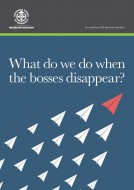
What do we do without managers?
There is a key trend relating to the manager’s role and its future. If everything is going to be all about clusters, networks and tribe organizations, what will become of the manager’s role. And how do we handle a world without line managers?
This is a trendspotting piece from guest writer Kjell Lindström.
Ever since Frenchman Henri Fayol formulated his ideas about how organizations should be managed, the line manager has been a central figure. Organizations comprise a chain of command in which a hierarchy of management posts either give or obey orders. The aim is to create an efficient and well-oiled organizational machine, where no issues fall between two stools or get lost in various decision-making vacuums.
Historically, the line organization has achieved most of its success in static or at least predictable environments.
The 1980s brought increased demands for efficiency, flexibility and adaptability. One of many ideas was that the line manager should be the role in which to integrate increasingly advanced theories, models and methods concerning HR issues, marketing, finance and management. The spotlight fell on line managers in the modern organization’s drive for cohesion and alignment.
During the 2000s, digital and other advances led organizations to move in the direction of “organizational landscapes”, where different organizational forms (line staff, processes, projects, networks and so on) were mixed up. This placed additional demands on line managers, in the form of dramatically increased requirements for coordination (even as assistants and secretaries were being lost) and the capacity to understand complex internal political maneuvering in ever more dynamic and rapidly changing organizations.
The rapid pace of digitalization is creating new conditions for organizations in general. Large organizations are going to reduce in number and be increasingly short-lived, as they are replaced by various clusters of networks between different types of small organizations.
In short, the former bastion of our management thinking – the line manager – is set to become an endangered species. The classic managers will become rare creatures in an emerging band of project managers, organizers, coordinators and entrepreneurs.
One likely prognosis is that we will see a wealth of management ideas based on entirely different principles. This presents us with three exciting future scenarios:
- We continue to cling on to the old ways. The consequence will be increasingly irrelevant management training courses and employee surveys.
- We see a period of “creative destruction” as the old economist Schumpeter would have put it, where we simply scrap much of the learning we laboriously built up, tested, systematized and certified in the 20th century.
- We see a mix of old and new, based on the understanding that while the old line organization may be under fire, it will remain with us for all eternity. The solution will be to keep and refresh a number of management theories and top them up with content more appropriate for our modern age.
As a trendspotter, I see an interesting future ahead. The question is – what does management mean in a world of network clusters, tribes and agile projects?
We’ll be following developments with interest.
Download this article:
This article is a trendspotting piece from guest writer Kjell Lindström – author and lecturer on SSE Executive Education’s Executive Leadership Program and Executive Management Program. Kjell has a passion for HR and organizational theory. And for trendspotting.
Kjell Lindström has a background as a lecturer and researcher at Uppsala University. He is editor of the trendspotting newsletter “noden trender” and is the author of books such as “Bortom tankefällan” (2013), “Äkta organisation”(2014) and “Den nakna ledningsgruppen” (2016).
In 2013, Kjell was awarded the Magnus Söderström Prize by Linnaeus University and the Union for Professionals for his contribution to Swedish HR.



